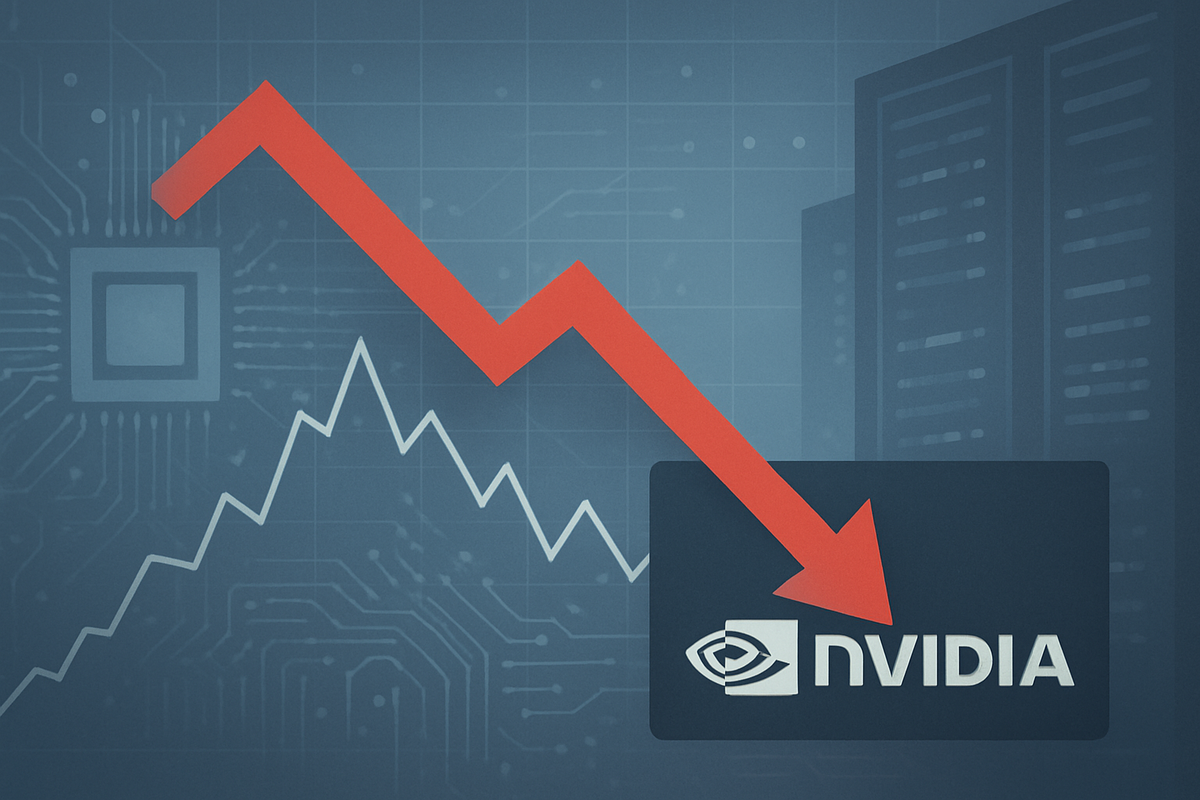
Nvidia (NASDAQ: NVDA), a titan in the semiconductor industry and a bellwether for the booming artificial intelligence sector, experienced a significant downturn in its stock performance today, November 18, 2025, making it a prominent loser on the Dow. The decline follows a surprise announcement from the company regarding a revised, more conservative outlook for its highly lucrative data center and AI division. This unexpected shift has sent ripples through the market, prompting investors to reassess the sustainability of the rapid growth seen in AI-related stocks and raising questions about the competitive landscape.
The immediate implications are a cooling of investor sentiment towards high-growth tech stocks, particularly those heavily reliant on AI. While Nvidia has enjoyed an unprecedented run fueled by insatiable demand for its GPUs, today's news suggests that even the market leader is not immune to competitive pressures and potential moderation in enterprise spending. This could signal a broader recalibration of valuations across the AI ecosystem.
The AI Juggernaut Faces Headwinds
Nvidia's stock decline today was primarily triggered by a mid-quarter update that adjusted its revenue guidance for the upcoming fiscal quarter. Management cited two main factors: intensifying competition in the data center GPU market and a slight, but noticeable, deceleration in enterprise AI infrastructure spending. Specifically, the company indicated that while demand remains strong, several key clients are extending their procurement cycles, and new offerings from competitors are beginning to gain traction in certain market segments.
The timeline leading up to this moment has seen Nvidia dominate the AI hardware space, with its H100 and upcoming B200 Blackwell GPUs becoming the de facto standard for training and deploying large language models. However, whispers of increased competition from rival chipmakers and major cloud providers developing their in-house AI accelerators have been growing louder. Today's announcement appears to confirm that these competitive pressures are now translating into tangible impacts on Nvidia's near-term outlook. Key players involved include Nvidia's executive leadership, who delivered the revised guidance, and institutional investors who reacted swiftly by offloading shares. Initial market reactions were sharp, with the stock plummeting over 8% in early trading, dragging down other semiconductor and AI-related equities.
Shifting Sands: Winners and Losers in the AI Race
The immediate beneficiaries of Nvidia's (NASDAQ: NVDA) revised outlook are likely its direct competitors in the AI and data center chip space. Advanced Micro Devices (NASDAQ: AMD), which has been aggressively pushing its MI300X accelerators, could see increased investor confidence and market share gains. AMD's stock saw a modest uptick following Nvidia's announcement, as investors speculated on a potential shift in purchasing patterns. Similarly, Intel (NASDAQ: INTC), with its renewed focus on AI chips and foundry services, might also attract renewed attention, particularly if enterprises look to diversify their AI hardware suppliers.
Cloud service providers like Amazon (NASDAQ: AMZN) with AWS, Microsoft (NASDAQ: MSFT) with Azure, and Google (NASDAQ: GOOGL) with GCP, who are developing their custom AI chips (e.g., AWS Trainium/Inferentia, Google TPU), could also indirectly benefit. A perceived weakening in Nvidia's near-term dominance might accelerate the adoption of these in-house solutions, offering customers more choice and potentially lowering overall AI infrastructure costs. Conversely, smaller AI hardware startups or companies heavily reliant on Nvidia's ecosystem might face increased scrutiny and potentially tighter funding if the broader AI investment landscape becomes more cautious. Companies specializing in AI software and services, however, might find themselves in a more stable position, as the underlying demand for AI applications continues to grow, regardless of which hardware powers them.
Broader Implications and Industry Repercussions
Nvidia's (NASDAQ: NVDA) stock decline today is more than just a blip for a single company; it signals a potential inflection point in the broader AI industry. For years, the narrative has been one of exponential growth and seemingly limitless demand for AI computing power. This event, however, introduces a dose of reality, suggesting that even in hyper-growth sectors, market dynamics like competition and spending cycles can exert significant influence. It fits into a broader trend where major tech companies are increasingly investing in proprietary hardware to reduce reliance on single vendors and optimize for their specific workloads, a move that naturally creates competitive pressure for established players like Nvidia.
The ripple effects could extend to the entire semiconductor supply chain, potentially leading to a re-evaluation of production capacities and investment strategies. Partners involved in manufacturing, packaging, and distributing Nvidia's chips might need to adjust their forecasts. Regulatory bodies, while not directly implicated by this specific event, continue to monitor the concentration of power in the AI sector. A more diversified competitive landscape, even if spurred by a market leader's temporary stumble, might be viewed favorably by antitrust regulators. Historically, rapid growth phases in tech often lead to periods of consolidation and increased competition, a pattern that appears to be playing out in the AI hardware space. Comparisons could be drawn to previous eras where dominant players in computing or networking eventually faced robust challengers, leading to a more fragmented market.
The Road Ahead: Adaptation and Innovation
In the short term, Nvidia (NASDAQ: NVDA) will likely face continued investor skepticism until it can demonstrate a clear path to reaccelerated growth or effectively counter competitive threats. The company may need to emphasize its software ecosystem, CUDA, and its full-stack AI platform even more vigorously as a differentiator beyond raw hardware performance. Strategically, we could see Nvidia accelerate its diversification efforts, potentially through acquisitions in complementary AI software or services, or by expanding into new markets beyond its core data center and gaming segments. The market opportunities that may emerge include increased demand for specialized AI chips optimized for specific tasks, and a greater emphasis on energy-efficient AI solutions as the scale of AI deployments grows.
Longer term, this event could force a strategic pivot across the industry, with a greater focus on cost-effectiveness and broader accessibility of AI infrastructure. Competitors will undoubtedly seize this moment to highlight their alternative solutions. For Nvidia, the challenge will be to maintain its innovation leadership while adapting to a more competitive and potentially more mature market. Potential scenarios include a sustained period of slower growth for Nvidia as the market diversifies, or a successful strategic pivot that allows the company to regain momentum. Investors should watch for Nvidia's next earnings call for further details on their strategy and any adjustments to their long-term outlook.
A Crucial Juncture for the AI Market
Today's stock decline for Nvidia (NASDAQ: NVDA) serves as a crucial reality check for the AI market. While the long-term trajectory for artificial intelligence remains undeniably upward, the event underscores that even the most dominant players are subject to the forces of competition and evolving market demand. The key takeaways are that the AI hardware market is maturing, competition is intensifying, and enterprise spending patterns can be more nuanced than previously assumed.
Moving forward, the market will likely become more discerning, differentiating between companies with truly sustainable competitive advantages and those whose valuations were primarily driven by speculative enthusiasm. Investors should closely monitor not just Nvidia's performance, but also the strategies of its competitors like AMD (NASDAQ: AMD) and Intel (NASDAQ: INTC), as well as the advancements in custom AI chips from major cloud providers. The lasting impact of this event could be a healthier, more competitive AI ecosystem, driven by innovation and a more balanced distribution of market share. What investors should watch for in coming months are any further guidance revisions, strategic partnerships or acquisitions by key players, and the performance of new AI chip architectures from across the industry.
This content is intended for informational purposes only and is not financial advice






